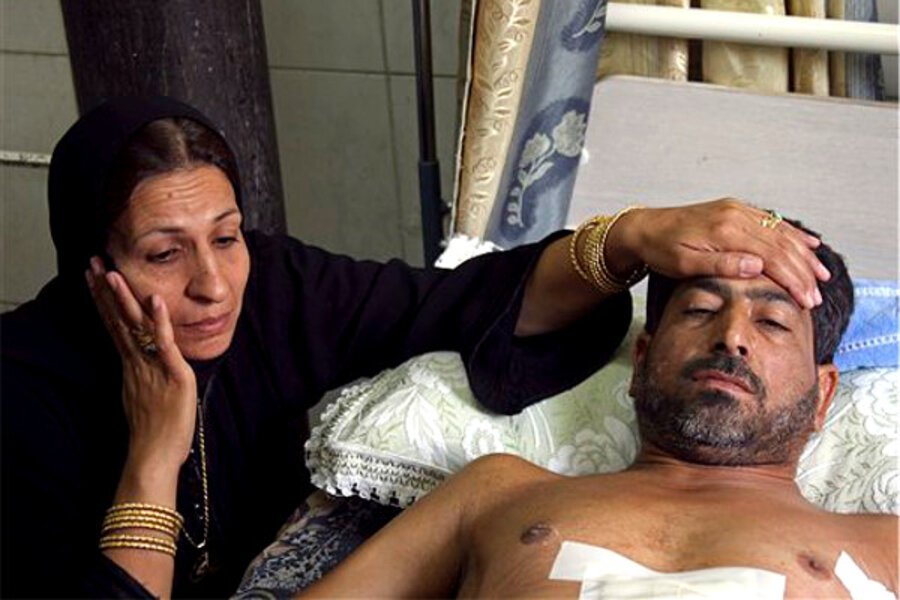Blackwater shootings: New charges filed against Blackwater contractors
Loading...
| WASHINGTON
The Justice Department on Thursday brought fresh charges against four former Blackwater Worldwide security contractors, resurrecting an internationally charged case over a deadly 2007 shooting on the streets of Baghdad.
A new grand jury indictment charges the men, who were hired to guard US diplomats, in a shooting that inflamed anti-American sentiment abroad and heightened diplomatic sensitivities amid an ongoing war.
The guards are accused of opening fire in busy Nisoor Square on Sept. 16, 2007. Seventeen Iraqi civilians died, including women and children. Prosecutors say the heavily armed Blackwater convoy launched an unprovoked attack using sniper fire, machine guns, and grenade launchers. Defense lawyers argue their clients are innocent men who were ambushed by Iraqi insurgents.
The guards were charged with manslaughter and weapons violations in 2008, but a federal judge the following year dismissed the case, ruling the Justice Department withheld evidence from a grand jury and violated the guards' constitutional rights. The dismissal outraged many Iraqis, who said it showed Americans considered themselves above the law. Vice President Joe Biden, speaking in Baghdad in 2010, expressed his "personal regret" for the shootings in declaring that the US would appeal the court decision.
A federal appeals court reinstated the case in 2011, saying now-retired Judge Ricardo Urbina had wrongly interpreted the law. Prosecutors again presented evidence before a grand jury, and US District Judge Royce Lamberth gave the Justice Department until Monday to decide what to do with the case.
The defendants include Dustin Heard, a former US Marine from Knoxville, Tenn.; Evan Liberty, a former US Marine from Rochester, N.H.; Nick Slatten, a former US Army sergeant from Sparta, Tenn., and Paul Slough, a US Army veteran from Keller, Texas.
Slatten is charged with 14 counts of voluntary manslaughter and 16 counts of attempt to commit manslaughter; Liberty and Heard are charged with 13 counts of voluntary manslaughter and 16 counts of attempt to commit manslaughter; and Slough is charged with 13 counts of voluntary manslaughter and 18 counts of attempt to commit manslaughter. All four were also charged with one count of using and discharging a firearm during and in relation to a crime of violence.
The men face lengthy prison sentences if convicted.
The defendants are charged under the Military Extraterritorial Jurisdiction Act, a statute that allows the government to prosecute certain government employees and military contractors for crimes committed overseas. Defense lawyers have argued that the statute does not apply in this case since the guards were working as State Department contractors, not for the military.
Heard's lawyer, David Schertler, said in an email that he was disappointed with the prosecution, which he believes has no merit.
"We will continue to fight and defend Dustin Heard's innocence and honor until he is fully exonerated," he said.
Lawyers for Slough and Slatten declined to comment. Liberty's lawyer had no immediate comment Thursday.
In a statement, US Attorney Ronald Machen. said the prosecution "demonstrates our commitment to upholding the rule of law even in times of war and to bringing justice to the memories of those innocent men, women and children who were gunned down in Baghdad more than six years ago."
Prosecutors last month agreed to dismiss their case against a fifth guard, Donald Ball, a retired Marine from West Valley City, Utah. A sixth guard, Jeremy Ridgeway of California, pleaded guilty and is awaiting sentencing.
The Justice Department had earlier dropped Slatten from the case, but after the appeals court decision revived the prosecution, the government contended that he remained a defendant.
The company formerly known as Blackwater Worldwide is under new ownership and is now headquartered in Virginia. It had changed its name to Xe Services, but the company was sold to a group of investors who then changed the name to Academi. Blackwater founder Erik Prince is no longer affiliated with the company.
In moving forward with the case, the government will seek to overcome some of the legal problems that have dogged the prosecution.
The case initially ran into trouble because the State Department promised the guards that their statements explaining what happened would not be used in a criminal case. The guards told investigators that they fired their weapons, a crucial admission because forensic evidence could not determine who fired.
Because of a limited immunity deal, prosecutors had to build their case without those statements, a high legal hurdle. In dismissing the case, Urbina said prosecutors had read the statements, reviewed them in the investigation and used them to question witnesses and get search warrants.
Court documents also reveal conflicting evidence, with some witnesses saying the Blackwater convoy was under fire and others saying it was not. Some said the entire convoy fired into the intersection; others said only a few men opened fire.





